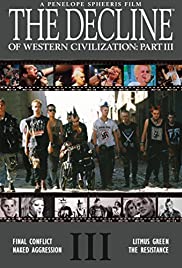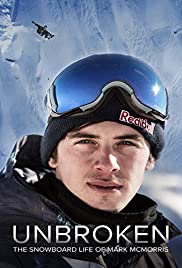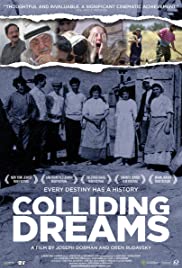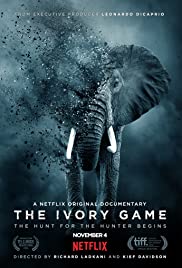
The Decline of Western Civilization III is a 1998 documentary film directed by Penelope Spheeris that chronicles the gutter punk lifestyle of homeless teenagers. It is the third film of a trilogy by Spheeris depicting life in Los Angeles at various points in time. The first film dealt with the punk rock scene during 1980-1981. The second film covers the Los Angeles heavy metal movement of 1986-1988. The film involves hardcore street punks called “gutter punks” who take the anti-establishment message with extreme seriousness, and tune out society completely. Spheeris talks to homeless teenagers living on the street or squatting in abandoned buildings in Los Angeles, as well as an unstable mother, Los Angeles Police Department officer Gary Fredo, and a paralyzed youth living on a disability.
You May Also Like

After a horrific backcountry accident leaves professional snowboarder Mark McMorris in the ICU, he fights for his life and faces an existential crisis.

From the peaks of Cape Cod’s surfing waves to the murky depths below, trouble runs deep on this beloved New England seashore after the first fatal shark attack in eighty years upends the community. With the predator population on the rise, and increasing encounters placing lives and livelihoods in peril, Great White Summer chronicles a season of struggle as people demand action, priorities are questioned, personal allegiances shift, and growing suspicion clouds the waters. Nature, culture, commerce and human life collide, with sheer survival at stake as sharks, surfers, scientists and society fight for everything they value.

We live at a moment in time when the Israeli-Palestinian conflict, now more than a century old, continues to be of overwhelming international political and societal importance. From its inception, that conflict has also, of course, had powerful and deeply troubling consequences for Israelis and Palestinians themselves. The story at its most basic level is one that involves two peoples struggling for national recognition and expression in a small but richly significant piece of land. The tragedy of this history, as both the Israeli novelist, Amos Oz, and the Palestinian scholar, Sari Nusseibeh, have each pointed out, stems from a conflict between the rights of two peoples with equal and legitimate aspirations to nationhood and self-expression in a single small territory to which they can both lay claim.

Narrated by Ben Kingsley this cinematic feature documentary looks at the life and work of a Mongolian national treasures. He is on a life long mission to heal all the patients under his care , all Mongolians and all humanity.

Reflecting Peter O’Toole’s theatrical legacy, this feature documentary is structured into four acts, each introduced by a quote about O’Toole that encapsulates his life during a specific period.

NOTHING IS TRUER THAN TRUTH is a feature length documentary about Edward de Vere, Seventeenth Earl of Oxford, A-list party boy on the continental circuit, who spent a year and a half in Venice and traveling in Europe, learning about commedia dell’arte and collecting the experiences that would become the Shakespeare plays. Shot in Venice, Verona, Mantua, Padua, and Brenta, the film ventures to actual sites De Vere visited in 1575-76, including the settings for THE MERCHANT OF VENICE, OTHELLO, ROMEO & JULIET, and TWO GENTLEMEN OF VERONA. The film features renowned Shakespeare scholars, actors, and directors, including Sir Derek Jacobi, Mark Rylance, Tina Packer, and Diane Paulus, and argues that De Vere’s bisexuality is the reason for the pseudonym Shake-speare.

In this documentary, experts dissect the Battle of Britain, which took place on Sept. 15, 1940 — a day that determined the fate of the nation.

A look at the life, success and scandals of golf legend Tiger Woods.

Wildlife activists and investigators put their lives on the line to battle the illegal African ivory trade, in this suspenseful on-the-ground documentary.

Rory Gallagher was the original Irish guitar hero, whose artistry with a battered ’61 Stratocaster became the stuff of legend. Bob Dylan and Muddy Waters admired him, the Rolling Stones tried to hire him – and his fans worshipped him. Clad in faded denim and a checked shirt, he sold 30 million records and became a charismatic icon of Irish music, inspiring musicians such as Brian May, The Edge, Slash and Johnny Marr. But away from the stage, Rory was an intensely private man. His closest confidante was his brother Dónal who accompanied Rory on his rise from their childhood Everly Brothers stage performances and the Showband scene across the North and South of the Irish border through to the deafening heart of the ‘70s rock scene in London – and far beyond. Now, Dónal, along with insights from Rory’s friends and admirers, takes us on a musical journey through the life and career of this shy guitar hero to better understand what made him so great.